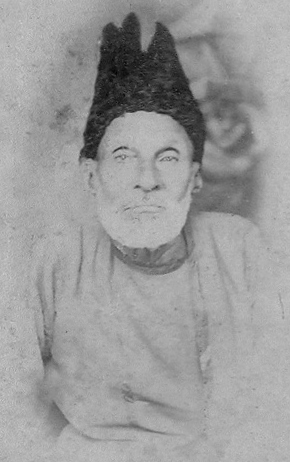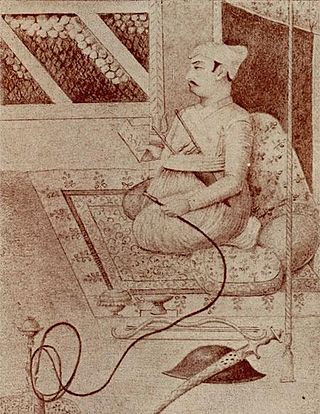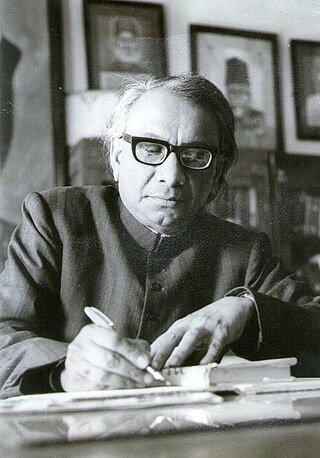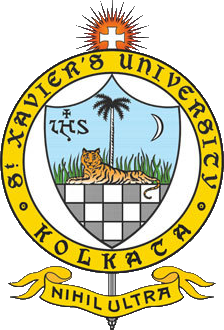Related Research Articles

Sayyid is an honorific title of Hasanids and Husaynids Muslims, recognized as descendants of the Islamic prophet Muhammad through his grandsons, Hasan ibn Ali and Husayn ibn Ali, sons of Muhammad's daughter Fatima and his cousin and son-in-law Ali.

Mirza Beg Asadullah Khan (1797–1869), also known as Mirza Ghalib, was an Urdu poet from Indian subcontinent. He was popularly known by the pen names Ghalib and Asad. His honorific was Dabir-ul-Mulk, Najm-ud-Daula. During his lifetime, the already declining Mughal Empire was eclipsed and displaced by the British East India Company rule and finally deposed following the defeat of the Indian Rebellion of 1857; these are described through his work.
Doctor of Letters also termed "Doctor of Literature" in some countries is a terminal degree in the arts, humanities and social sciences that, depending on the country, is a higher doctorate after the Doctor of Philosophy (Ph.D.) degree or equivalent to a higher doctorate, such as the Doctor of Science or Doctor of Laws (LL.D). It is awarded in many countries by universities in recognition of superior accomplishment in the Arts, Social Sciences or humanities, such as original contributions to the creative or cultural arts, or scholarship in Social Sciences and humanities and other merits. It may be conferred as an earned degree upon the completion of a regular doctoral course of study, usually including the development and defense of an original dissertation, or may be conferred as an earned higher doctorate after the submission and academic evaluation of a portfolio of sustained scholarship, publications, research, or other scientific work of the highest caliber.

Syed Muhammad ibn Yousuf al-Hussaini, commonly known as Khwaja Banda Nawaz Gesudaraz, was a Hanafi Maturidi scholar and Sufi saint from India of the Chishti Order.

Mir Qasim was the Nawab of Bengal from 1760 to 1763. He was installed as Nawab with the support of the British East India Company, replacing Mir Jafar, his father-in-law, who had himself been supported earlier by the East India Company after his role in winning the Battle of Plassey for the British. However, Mir Jafar eventually ran into disputes with the East India Company and attempted to form an alliance with the Dutch East India Company instead. The British eventually defeated the Dutch at Chinsura and overthrew Mir Jafar, replacing him with Mir Qasim. Qasim too later fell out with the British and fought against them at Buxar. His defeat has been suggested as a key reason in the British becoming the dominant power in large parts of North and East India.

Hakim Syed Zillur Rahman is an Indian scholar of Unani medicine. He founded Ibn Sina Academy of Medieval Medicine and Sciences in 2000. He had earlier served as Professor and chairman, Department of Ilmul Advia at the Ajmal Khan Tibbiya College, Aligarh Muslim University, Aligarh, for over 40 years before retiring as Dean Faculty of Unani Medicine. Presently, he is serving AMU as "Honorary Treasurer". In 2006, the Government of India awarded him the Padma Shri for his contribution to Unani Medicine.
Koath is a notified area in Rohtas district in the Indian state of Bihar.

Satya Vrat Shastri was an Indian Sanskrit scholar, writer, grammarian and poet. He wrote three Mahakavyas, three Khandakavyas, one Prabandhakavyas and one Patrakavya and five works in critical writing in Sanskrit. His important works are Ramakirtimahakavyam, Brahattaram Bharatam, Sribodhisattvacharitam, Vaidika Vyakarana, Sarmanyadesah Sutram Vibhati, and "Discovery of Sanskrit Treasures" in seven volumes.
Mushirul Hasan was a historian of modern India. He wrote on the partition of India, communalism, and on the history of Islam in South Asia.

Abdul Qavi Desnavi was an Indian Urdu language writer, critic, bibliographer and linguist. He wrote many books on Urdu literature. His works included about Maulana Abul Kalam Azad, Mirza Ghalib and Allama Muhammad Iqbal. He was awarded with several awards for his literary works.
Nazir Ahmed (1915-2008) was an Indian scholar, writer, and teacher of the Persian language. He was honoured by the Indian Government in 1987 with the Padma Shri. He received this award for his contributions to the propagation of Persian Language and literature.

Naheed Abidi is an Indian scholar of Sanskrit and writer. In 2014, she was honoured with Padma Shri, the fourth highest civilian award, for her contributions to the field of literature by the Government of India.
Narendra Kumar Pandey is an Indian surgeon, and founder of the Asian Institute of Medical Sciences. He was bestowed the Padma Shri, the fourth highest civilian award, in 2014..
Mehmood-ur Rehman was an Indian civil servant, best known as the chairman of the 2008 Committee on Socio-Economic Backwardness of Muslims in Maharashtra. He was Vice-Chancellor of Aligarh Muslim University from 1995 to 2000 and served as the chairman of Bombay Mercantile Cooperative Bank.

Harkishan Singh was Professor Emeritus at the Panjab University. He was a well recognized pharmaceutical academic, medicinal chemistry researcher and science historian. He had more than half a century experience in his respective fields to his credit. He worked at the Banaras Hindu University, University of Saugar, and the Panjab University in India, and abroad at the University of Maryland, University of Mississippi and the University of London.

Syed Hasan was an Indian writer, scholar and professor of Persian language and literature from Patna, Bihar. He was a great scholar "steeped into Persian". He headed the Persian Department of Patna University from 1972 to 1978. In 1954–55, he was awarded a scholarship under the Government of India Foreign Languages Scholarships Scheme for Studying in Iran.

St. Xavier's University Kolkata is a Jesuit university located in New Town, Kolkata, India. It was established in February 2017 and inaugurated in July of the same year.

Mirza Ghalib Award, commonly known as Ghalib Award, is a literary award and an honor in India presented annually in the month of December by Ghalib Academy. It was established and named after a greatest Indian poet Ghalib. The award seeks to recognize those writers and researchers who have made "meritorious contribution" to Urdu and Persian literature. It carries an amount of cash reward ₹25,000 to 50,000 and an insignia along with a citation and a certificate of commendation.
Abul Kalam Qasmi was an Indian scholar, literary critic, and a poet of the Urdu language who served as the dean of the Faculty of Arts at the Aligarh Muslim University. He was the editor of Tehzeeb-ul-Akhlaq and authored books such as The Criticism of Poetry. He translated E. M. Forster's Aspects of the Novel into Urdu as Novel ka Fun. He was conferred with the Sahitya Akademi Award in 2009, and the Ghalib Award in 2013.
References
- ↑ "Professor Syed Hasan Askari | Historian". prof-s-h-askari. Retrieved 13 June 2019.
- ↑ "Eminent Personalities". www.kujhwaonline.in. Retrieved 8 July 2019.
- ↑ "State forgets first historian". www.telegraphindia.com. Retrieved 8 July 2019.
- ↑ "State forgets first historian". www.telegraphindia.com. Retrieved 8 July 2019.
- ↑ Ridgeon, Lloyd V. J. (February 2008). Sufism: Hermeneutics and doctrines. Routledge. ISBN 9780415426244.
- ↑ Askari. "An Introduction to Twenty Persian Texts on Indo-Persian Music". Humanities Commons.
- ↑ "Select Bibliography: Sufi Literature in South Asia". Sahapedia. Retrieved 8 July 2019.
- ↑ "The Milli Gazette". www.milligazette.com. Retrieved 8 July 2019.
- ↑ "Ghalib Institute غالب انسٹی ٹیوٹ: Ghalib Award". Ghalib Institute غالب انسٹی ٹیوٹ. Retrieved 8 July 2019.
- ↑ "Bharat Ratna, Padmavibhushan, Padmashree and other Award winners". www.patnauniversity.ac.in. Archived from the original on 29 May 2019. Retrieved 8 July 2019.
- ↑ Iran: Journal of the British Institute of Persian Studies. The Institute. 1993.